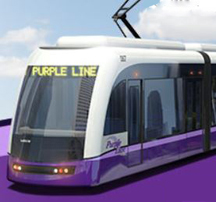Update!
ACT called on Montgomery County to halt Columbia Country Club's lobbying against the Purple Line.
Columbia Country Club's Role in Purple Line Opposition
Chevy Chase's exclusive Columbia Country Club has been the core of the opposition to light rail in Montgomery County ever since 1989, when the county purchased old railroad tracks alongside its golf course. The club initially tried to exclude the public altogether by creating a nature reserve. When that gambit failed, the golfers reversed course and funded a coalition that advertised itself as the voice of hikers and bikers who want to preserve trees along their trail.
A rare moment of frankness occurred in 1996. The club's attorney, Dennis Osterman, told the Gazette [June 5, 1996] that running light rail through the club would be a “recipe for disaster” because it would force the club to move tees at the 15th and 18th holes. That would “change the competitive dynamics of a golf course that has been around since 1911,” Osterman explained.
The country club's role in orchestrating opposition to the Purple Line was unmasked in 2008 by a leaked letter from club president J. Paul McNamara and a subsequent expose by Washington Post reporter Katherine Shaver.
The March 24, 2008, letter revealed a plan to “launch a grassroots campaign to identify and organize a broad and diverse coalition of opponents to the current proposal for the Purple Line.” Soon thereafter, a new group called Alliance for Smart Transportation (A4ST) appeared, with a website registered in the Madeira Islands, a tax haven located off the coast of Africa, through a service called “Domain Discreet” that conceals the name of the true owner.
The Post's research revealed that A4ST is headed by Geoffrey Gonella, a member of Columbia Country Club's Board of Governors. Gonella was a lobbyist who specialized in creating “grassroots” backing for paying clients, a practice often referred to as “astroturf,” and was rated by Golf Digest among the best golfers in the Washington lobbying corps.
Joining Gonella on A4ST's executive committee was Glenn Cowan, another lobbyist with a specialty in astroturf. Cowan was a pioneer of this technique, coming to public attention in 1990 when he helped create a “grassroots” group called Nevadans for Fair Fuel Economy Standards to fight the Clean Air Act. Cowan's consulting firm was working for automobile manufacturers, but most of the people on the group's letterhead later contacted by the Boston Globe said that they had not been informed of the industry sponsorship. “I got the impression this was agroup of concerned people and not the auto industry. It was done in a surreptitious manner,” county government official Bob Stewart told the Globe.
In the 1990s, Cowan and Gonella worked together at lobbying powerhouse Cassidy & Associates, whose founder Gerald Cassidy is himself a member of Columbia. Cowan ran the firm's astroturf operations while Gonella recruited new clients. Cowan's astroturf clients included the oil, tobacco, pharmaceutical and telecom industries.
In 1995, Cowan was caught up in another scandal, this time involving use of names without permission. Operators in a boiler room operated by a subcontractor were supposed to call people and read a script asking if they were in favor of competition in telecommunications. If the answer was yes, they were asked if a message could be sent to Congress in opposition to a bill that long-distance companies wanted to defeat. Messages were sent signed by 56,000 people who had not given permission.
The McNamara letter does not reveal how much the country club—which charges an initiation fee of $70,000—is spending, but the expenditure is not small. Not enough money could be found in an annual budget of more than ten million dollars, and the club drew from its capital reserves. “The only grass roots at Columbia Country Club grow in the fairways,” commented Karren Pope-Onwukwe, co-chair of Prince George's Advocates for Community-based Transportation.
The club promised to end its opposition to the Purple Line in June 2013, after the Maryland legislature passed a gas tax increase intended to fund construction of the light rail line. This promise was made in exchange for the state's agreement to move the tracks a few feet to the side and swap some small slivers of land with the club. This allows the tees to remain in locations that give the golf course the best competitive conditions.

